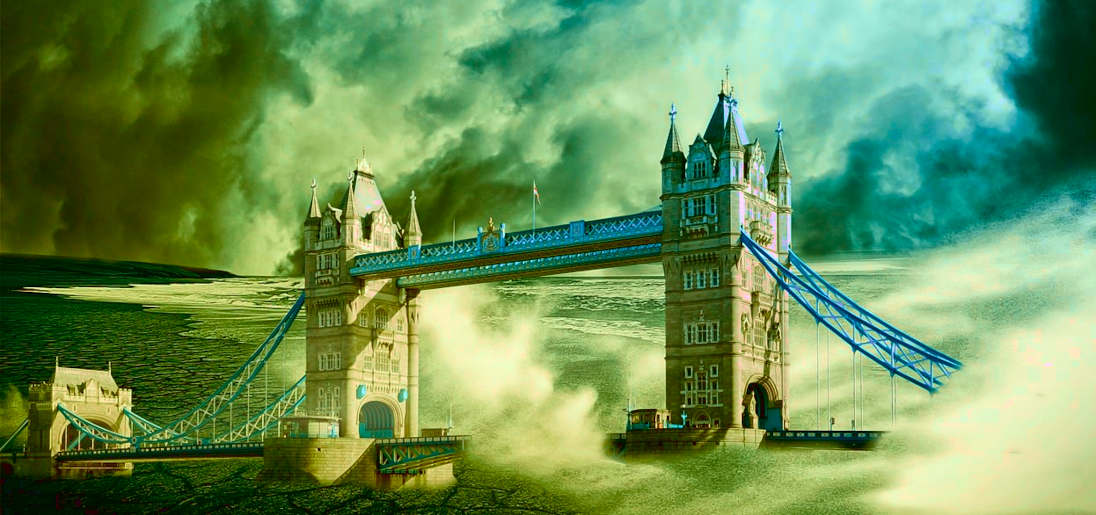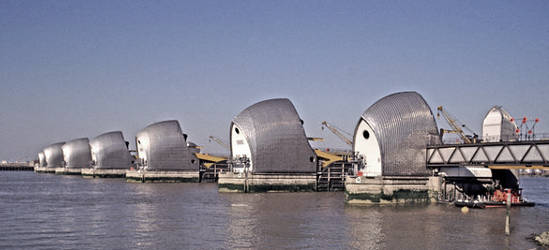
London in the sea?
As sea levels keep rising, is London still safe?
Linguapress environmental
An
intermediate
level English resource ~ Environment.
Planet Earth is getting hotter, and the level of the sea is rising. This is going to cause massive problems for many seaside cities; and London is one of them.
Many
parts of London
will
be under water by 2060, if nothing is done to protect them.
Finish
writing this article! Twenty
words have been left out! Choose
the correct word in each dropdown box. Only one word is
acceptable in each case. Some choices test vocabulary, others
grammar... and some just require logic!

The Thames Barrier...Will this still be enough to protect London in 2050?
As a result of global the sea level around the south east corner of England is expected to by 54 cms in just half a century! And now say that many parts of London will be at serious risk from flooding by the sea 50 years.
It's not all of London that is in danger; just some parts to the east of the city. And they won't be under water the time; just when there are very tides.
The low-lying suburbs beside the Thames in the End of London are already protected from tides by a massive barrier that right across the river; but more defences will be along the banks of the Thames to protect a larger to the north of the river, and further east. And no-one really if the existing Thames Barrier will actually be enough to protect London, even in 2050.
The Thames barrier was opened in 1982. the first ten years of its life, it was on average, just once a year. Some years it was closed at all. 2000 and 2013, it was closed an average of six times a year; and in the year 2013-2014, it was closed 50 times.... in twelve . The level of the sea is getting steadily that is certain.
Other towns and low lying areas in the east of England are facing similar problems; and it will take a lot of time, and cost a lot of money, to protect them.
Of course, there have always been occasional very high tides. A thousand years ago, there were big floods around London; and in 1953, before the Thames Barrier was built, over 300 people lost their lives in "the big flood"; but today the dangers are bigger. There are more people, more roads, more infrastructure. In the past, people did not build in places where there was a risk of flooding. Today, in southeast England, land is so expensive, that people build everywhere – even in places that are liable to be flooded.
Scientists also say that climate change is going to lead to warmer and drier summers in the south east of England. This will cause major changes in vegetation, and several species of native wildlife will not be able to survive. Wet in winter, hot in summer: is that going to be London in fifty years' time ?
London faces big problems in the next fifty years; but London is a rich city, which can pay to build the protections that will be needed. London's difficulties are likely to be be very small, compared to the problems that will be faced in some of the world's poorer counties, like Bangla Desh.

steps : measures, actions - prevent : stop - half a century : 50 years - to flood: to cover the land with water - tides: the rise and fall of the ocean - suburb: exterior part of a city - bank of a river: the side of a river - average : medium - steady : regular, constant - infrastructure : buildings, roads, services - are liable to be : will perhaps be - species: variety, sort
Missing words - answers.
The full text, with the correct answers, can be found in the answers section of A Background to English, the new paperback "best of" B1-B2 intermediate texts from Linguapress.
As well as answers, this collection of 27 texts includes some texts not available online, and access to more audio recordings.
Return to Linguapress site index
Printing: Optimized for A4 printing
Copyright © Linguapress. Do not copy this document to any other website
Copying permitted for personal study, or by teachers for use with their students.
This document, with exercises and
answers, is included in A
Background to English, a collection of 27 B1 -
mid-B2 intermediate English reading texts, with
exercises and answers, available from Amazon
worldwide, and leading
bookstores including Bookshop.org in the USA
and Waterstones in the UK.
Student Worksheet
London in the Sea
Replace all the missing prepositions in this extract from the article. You will need to use the following prepositions, which you can copy or slide from the list.across along around as at before beside by by by from from of of on in in to under within
London the Thames, yes; but London the Sea?
No thank
you! But this could happen
2060,
unless
steps are taken quite quickly, to prevent it.
a result global warming, the sea level the south east corner of England is expected to rise 54 cms just half a century! And scientists now say that many parts of London will be serious risk flooding the sea 50 years.
It's not all of London that is in danger; just some parts the east the city. And they won't be water all the time; just when there are very high tides.
The low-lying suburbs the Thames in the East End of London are already protected high tides a massive barrier that stretches right the river; but more defences will be needed the banks of the Thames to protect a larger area to the north of the river, and further east.
a result global warming, the sea level the south east corner of England is expected to rise 54 cms just half a century! And scientists now say that many parts of London will be serious risk flooding the sea 50 years.
It's not all of London that is in danger; just some parts the east the city. And they won't be water all the time; just when there are very high tides.
The low-lying suburbs the Thames in the East End of London are already protected high tides a massive barrier that stretches right the river; but more defences will be needed the banks of the Thames to protect a larger area to the north of the river, and further east.
For
teachers:
For
a short general guide to using reading texts in class, see ► Reading texts - a
model lesson plan
Grammar: expressing the future. This text has lots of examples showing how we can express future time in English. Most of these involve the use of the future tense with will, which is used in the active and the passive, and in affirmative and negative phrases; but there are other ways of expressing the future too, including the use of going to... Note how the modal verb could expresses future time in the first sentence; and in the second paragraph the expression is expected to also expresses an action in the future.
Even expressions like are liable to and are likely to express future possibility, though use a present tense to do so.
For a full overview about expressing the future, see A Descriptive Grammar of English, part 1.3
Pair work: sketches. It is 2050, and large parts of eastern London are under water. Have pupils, working in pairs, imagine an interview between a journalist and Mayor of London.
Other ideas?
EFL teachers: Help develop this resource by contributing extra teaching materials or exercises.
Click here for further details
This teaching resource is © copyright Linguapress
Revised from a shorter item originally published in Freeway, the Intermediate level English newsmagazine.
Republication on other websites or in print is not authorised


 Level
- easy intermediate.
Level
- easy intermediate.
